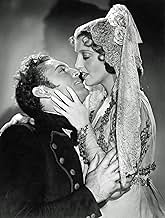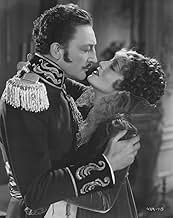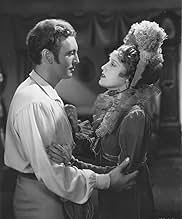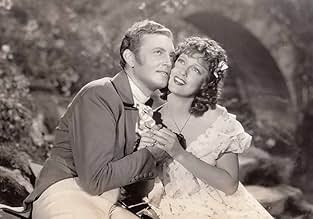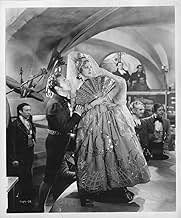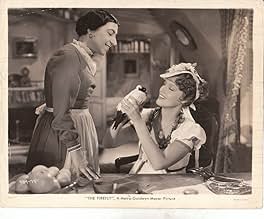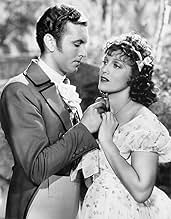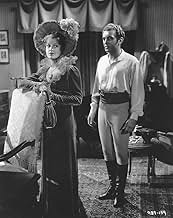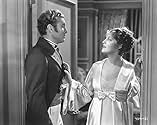NOTE IMDb
6,8/10
446
MA NOTE
Pendant les guerres napoléoniennes, les aventures et les amours d'une espionne espagnole, chanteuse de cabaret.Pendant les guerres napoléoniennes, les aventures et les amours d'une espionne espagnole, chanteuse de cabaret.Pendant les guerres napoléoniennes, les aventures et les amours d'une espionne espagnole, chanteuse de cabaret.
- Réalisation
- Scénario
- Casting principal
- Récompenses
- 3 victoires au total
Douglass Dumbrille
- Marquis de Melito
- (as Douglas Dumbrille)
Tom Rutherford
- King Ferdinard
- (as Tom Rutherfurd)
Corbet Morris
- Duval
- (as Corbett Morris)
Victor Adams
- Jail Guard
- (non crédité)
Monya Andre
- Civilian Wife
- (non crédité)
Sam Appel
- Fruit Vendor
- (non crédité)
Pilar Arcos
- Gypsy
- (non crédité)
Hooper Atchley
- French Soldier Requesting Flowers
- (non crédité)
Avis à la une
is exceptional in this OK Napoleonic War film. Anyone who ever thought MacDoanld was just a bland operatic singer needs to see this film. She plays a spy posing as a camp follower. MacDonald has a sexy dance number that is just a knockout. She is as sultry and sexy as any star of her era. MacDonald was a great singer who was also a great actress and comic. She is superb. Starring here with Allan Jones and Warren William, the film is a tad long, but still eminently watchable. Jones and MacDonald introduced the big hit "Donkey Serenade" in this film. Good support from Billy Gilbert, Henry Daniell, Douglas Dumbrille, and George Zucco. Not as snappy as some of her films with Nelson Eddy, but this is Jones' best film aside from the 1936 Show Boat with Irene Dunne. Give this one a watch and marvel at Jeanette MacDonald!
Spy-thrilla where Jeannette MacDonald must get napoleonic soldiers to reveal their secrets. Warren Williams (The Lone Wolf!) is the Major; Billy Gilbert who sneezed his way through films is the innkeeper. Douglass Dumbrille always played the bad guy, and here is the Marquis. Dance numbers, singing. It's Jeanette MacDonald, who always does operatic arias. Yawn. Pretty dated stuff. Intrigue. suspense. love triangles. It's a pretty dry period piece, which is never my first choice. Kind of a mata hari. Showing on Turner Classics. It's pretty well done, but moves pretty slowly. the songs keep bringing it to a screeching halt. I'd skip this one unless you're a fan of J. MacDonald. Directed by Robert Leonard... nominated twice, but never got the Oscar.
Allan Jones has a wonderful voice, but a rather bland personality. He is no match for Jeannette MacDonald, who here gives her best dramatic performance on screen with not much to play against. Warren William is the villain and he has more presence than Jones.
Jones and MacDonald play spies, he for France and she for Spain, during Napoleon's attempt to kidnap the King of Spain and add that country to his fiefdom. There is much intrigue and a few songs along the way, the best known being The Donkey Serenade and Gianina Mia.
The problem lies in the length of the scenes and musical numbers. This film could easily have had half an hour snipped out of it, bringing it closer to conventional playing times of the period. At 2 hours, 10 minutes, it is just too long. And it is heavy-handedly directed and written.
The original operetta from 1912 had a few good tunes. Friml was third in line of talent, behind Romberg and Herbert, as America's trio of operetta composers. The score is just not good enough to mount a major film around.
MacDonald is always worth seeing, as she either matches or outshines her best material. This one, like Broadway Serenade a few years later, was not one of her best films and is recommended for her fans and those of Jones only.
Jones and MacDonald play spies, he for France and she for Spain, during Napoleon's attempt to kidnap the King of Spain and add that country to his fiefdom. There is much intrigue and a few songs along the way, the best known being The Donkey Serenade and Gianina Mia.
The problem lies in the length of the scenes and musical numbers. This film could easily have had half an hour snipped out of it, bringing it closer to conventional playing times of the period. At 2 hours, 10 minutes, it is just too long. And it is heavy-handedly directed and written.
The original operetta from 1912 had a few good tunes. Friml was third in line of talent, behind Romberg and Herbert, as America's trio of operetta composers. The score is just not good enough to mount a major film around.
MacDonald is always worth seeing, as she either matches or outshines her best material. This one, like Broadway Serenade a few years later, was not one of her best films and is recommended for her fans and those of Jones only.
I am told that the original plot of The Firefly has seen on Broadway back in 1912 had absolutely nothing to do with the Peninsular Campaign of the Napoleonic Wars. Hard to believe because the plot here seems so right.
The core of the plot is duty to one's country. Though Allan Jones and Jeanette MacDonald are on opposite sides and love each other, at some point each betrays the other at some point in the movie to gain a tactical advantage for France or Spain.
The Rudolf Friml-Otto Harbach-Oscar Hammerstein II, is mostly retained for the movie. One new song, based on a Friml instrumental composition called Chanson, is given a lyric by Bob Wright and Chet Forrest and arranged by MGM's house composer Herbert Stothart. Their combined efforts yielded The Donkey Serenade and provided Allan Jones a signature song for the rest of his career.
Jeanette was taking a rest from her usual singing partner, Nelson Eddy, and her teaming with Jones was felicitous. They are a pair of winning songbirds. Maybe had Jones stayed with MGM, he and MacDonald might have made some more films together. Maybe he might have played some of the parts that Nelson Eddy did opposite her. But he probably was right in thinking he'd always be number 2 at MGM, so he moved to Universal.
Beautiful singing and a decent plot in this one. Go see it.
The core of the plot is duty to one's country. Though Allan Jones and Jeanette MacDonald are on opposite sides and love each other, at some point each betrays the other at some point in the movie to gain a tactical advantage for France or Spain.
The Rudolf Friml-Otto Harbach-Oscar Hammerstein II, is mostly retained for the movie. One new song, based on a Friml instrumental composition called Chanson, is given a lyric by Bob Wright and Chet Forrest and arranged by MGM's house composer Herbert Stothart. Their combined efforts yielded The Donkey Serenade and provided Allan Jones a signature song for the rest of his career.
Jeanette was taking a rest from her usual singing partner, Nelson Eddy, and her teaming with Jones was felicitous. They are a pair of winning songbirds. Maybe had Jones stayed with MGM, he and MacDonald might have made some more films together. Maybe he might have played some of the parts that Nelson Eddy did opposite her. But he probably was right in thinking he'd always be number 2 at MGM, so he moved to Universal.
Beautiful singing and a decent plot in this one. Go see it.
10guidon7
Wonderful mix of music, romance and comedy but I concede a trifle too long, the length however acceptable with these two. Jeanette MacDonald could do everything; sing beautifully, act as well and surprisingly (I just watched this one after many years) a gifted dancer. MacDonald and Jones are quite compatible and I can see where, had fate taken a hand, it could have been these two and not Nelson Eddy, not to downgrade Nelson's resonant baritone in any way. Allan Jones was a better actor, and was one of the finest tenors in movie history. There was one brief comic bit I found hilarious -- it was so short it may have been overlooked by many. Don Diego (Allan Jones) is singing the famous Donkey Serenade to MacDonald as she rides along in a coach. He sings the line "But try as she may, in her voice there's a flaw", to this jibe at her voice, Jeanette's displeasure shows in a grimace! The expert supporting cast is up to MGM'S standards; Warren William, Billy Gilbert, George Zucco, Douglas Dumbrille, Henry Daniell and even a one-line appearance by Ralph Byrd (a.k.a. Dick Tracy in the 1940's). I highly recommend this film, especially to fans of light operetta. The music is delightful and Jeanette and Allan give it their all. Jones' last appearance was a 1980 role on the Love Boat TV program. Upon retirement from the screen (big screen and little) he became a dentist, quite a surprise. I wonder if he sang for his patients? If he did I'm sure his waiting list was the envy of his fellow dentists.
Le saviez-vous
- AnecdotesThe song "The Donkey Serenade" was not in the original stage production. It was written for the film, but the music was adapted from the song "Chansonette," from the stage version of "The Firefly."
- GaffesWhen by the bridge we see a female with very long black plaits walking with her beau across the bridge. Not long after we see a closer shot of them about to walk across the bridge.
- Citations
Don Diego: You have one bad habit.
Nina Maria Azara: Oh, yes? What?
Don Diego: You're always saying good-bye.
Nina Maria Azara: Very well then, I won't say good-bye. I'll just go!
- Crédits fousEach time the dancing girls dance across the screen, a new screen credit is revealed.
- ConnexionsFeatured in MGM Parade: Épisode #1.25 (1955)
- Bandes originalesLove Is Like a Firefly
(uncredited)
Music by Rudolf Friml
Lyrics by Bob Wright and Chet Forrest
Sung by Jeanette MacDonald
Meilleurs choix
Connectez-vous pour évaluer et suivre la liste de favoris afin de recevoir des recommandations personnalisées
Détails
- Durée
- 2h 11min(131 min)
- Rapport de forme
- 1.37 : 1
Contribuer à cette page
Suggérer une modification ou ajouter du contenu manquant


